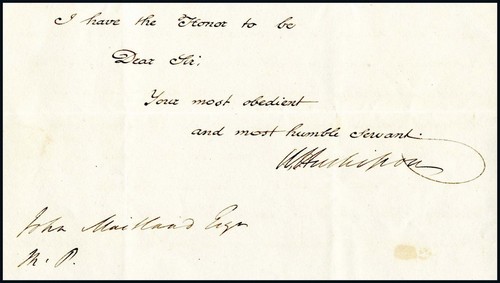
Auction: 14035 - Postal History, Autographs and Historical Documents
Lot: 3044
Historical Documents
William Huskisson, the First Man to Die on the Railway
1808 (21 June) letter from Downing Street to John Maitland, requesting his attendance at the House to vote on a bill proposed by Spencer Percival concerning compensation to be paid to John Palmer, the originator of mail coaches. Signed "W. Huskisson" and the recipient's name. Fine. Photo
William Huskisson (1770-1830), President of the Board of Trade. In 1808 he was Secretary to the Treasury.
The Chancellor of the Exchequer, Spencer Percival, was trying to get through the annual Act for various grants (heads of government expenditure). The House of Lords had the power to reject the whole but not to amended parts, and Percival feared that their opposition to a proposed grant to John Palmer would lead to the entire Act being rejected. He therefore proposed to deal with the Palmer grant separately.
John Palmer (1742-1818) devised the system of mail coaches and, for a time, was comptroller general of the Post Office. Dismissed in 1794 he campaigned strongly for a proper reward for his work. Percival's instincts were correct as three Acts were rejected before Palmer was awarded £13,000 in 1813.
The opening of the Liverpool and Manchester Railway (L&M) took place on 15 September 1830. The opening day was a major public event. Arthur Wellesley, Duke of Wellington, the Prime Minister, rode on one of the eight inaugural trains, as did many other dignitaries and notable figures of the day. Huge crowds lined the track at Liverpool to watch the trains depart for Manchester. William Huskisson, former cabinet minister and Member of Parliament for Liverpool was a highly influential figure in the creation of the British Empire and an architect of the doctrine of free trade, but fell out with Wellington in 1828 over the issue of parliamentary reform and resigned from the cabinet. Hoping to be reconciled with Wellington, he approached the Duke's railway carriage and shook his hand. Distracted by the Duke, he did not notice an approaching locomotive on the adjacent track, Rocket. On realising it was approaching he panicked and tried to clamber into the Duke's carriage, but the door of the carriage swung open leaving him hanging directly in the path of the oncoming Rocket. He fell onto the tracks in front of the train, suffering serious leg injuries, dying later that night.
Subject to 20% VAT on Buyer’s Premium. For more information please view Terms and Conditions for Buyers.
Sold for
£200




